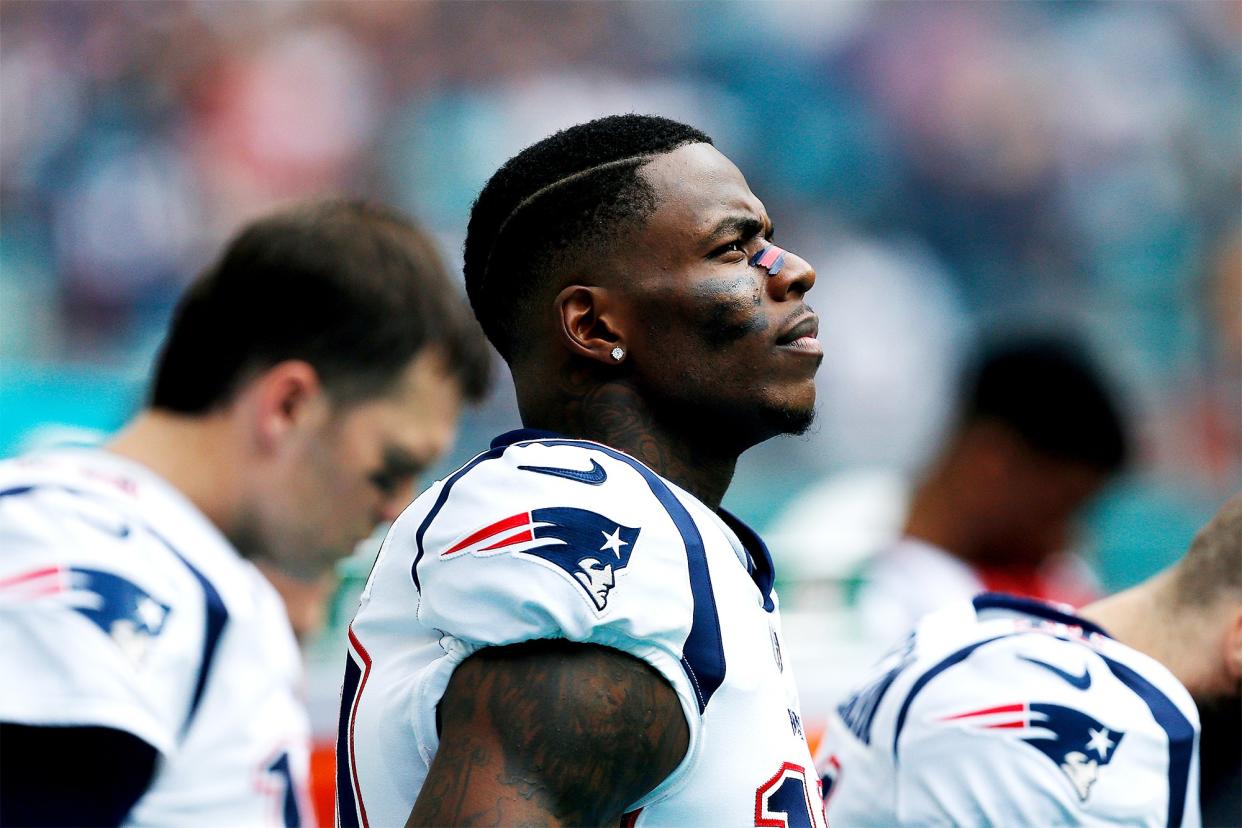Josh Gordon Was Never Going to Find Peace on a Football Field

Earlier this week, Josh Gordon announced that he will be “stepping away from football” indefinitely to focus on his mental health. Given that Gordon is facing yet another suspension for violating the conditions of his reinstatement under the NFL’s substance abuse policy, his decision was not entirely voluntary, and periods of prolonged absence have long been the defining feature of his playing career. But there is an air of finality around this development: We may never see Gordon on a football field again, and for the first in his life, getting back to one is not his top priority.
Since Gordon entered the league in 2012, his teams have played 124 regular-season games. He has participated in 52 of them. The quintessential “troubled athlete,” Gordon has been suspended repeatedly for failing drug tests—missing two entire seasons as a result—and an additional time for a drunk driving incident in September 2014.
He also never tried to downplay the gravity of his situation. A year ago, Gordon candidly detailed his lifelong struggles with substance abuse, telling GQ’s Clay Skipper that he had never played football “without something in my system.” Since his teens, Gordon has self-medicated with a vengeance. He’s not a partier, or someone whose lifestyle is at odds with a square work environment. Josh Gordon is an addict, and has always represented himself as such.
Gordon is an extremely sympathetic figure: He’s had a hard life, and seems to be well-liked by his peers, and—as far as we know—has never hurt anyone except himself. And above all else, sports is a business, and he is a freakishly gifted football player, and for the Patriots and the Cleveland Browns before them, the potential reward of having him on the roster always outweighed the attendant risk. For all the moralistic truisms about how work ethic and character define great athletes, there is really no substitute for talent. Throughout Gordon's career, the possibility of what he could do always loomed so large that the NFL just couldn’t quit him.
The term “tragic figure” gets thrown around liberally in sports, where it is used to describe anyone whose career is cut short or otherwise limited, usually because of injury. Gordon was closer to the precise, classical definition of the term, though: a heroic character whose imperfections ultimately bring about his downfall. It isn’t right to say that Gordon “made mistakes,” as questions of free will and addiction never have straightforward answers. But it is undeniable that who Gordon was stood in the way of what he could have become.
By now, few thinking people criticize him as a failure or malingerer anymore; his demons are so evident and his flaws so pronounced that condemning him for “squandering” anything bordered on cruelty. Instead, he is mourned as someone who couldn’t get out of his own way—and who, as a result, was denied a future that appeared, to outsiders, to be well within reach. Gordon didn’t waste anything; he was a waste, insofar as the universe conspired to keep him from using his prodigious talents to rack up thousands of yards and score dozens of touchdowns.
As Gordon bows out, probably for the final time, lamenting him like this might feel like an act of wistful compassion; he kept wanting to play, and we kept wanting to see him do it. But here, what is good for Josh Gordon the person and Josh Gordon the football player diverge sharply. It would be nice if professional accomplishments were the correct metric for his success—if Gordon were the sort of person able to focus wholly on football. But that’s just not the hand he was dealt. His entire life has been overshadowed by addiction, and when that happens, getting healthy and staying alive—the very act of survival—becomes the highest priority.
Playing in the NFL is stressful, arduous, and hazardous, and like every line of work that shares those characteristics, it exacerbates mental health issues and presents all sorts of dangerous pitfalls for an addict like Gordon. Even though the available evidence indicated that this life didn’t suit him, comebacks offered an opportunity to return to something that, for a football player, looks like normalcy—and to convince himself that things were better than they were.
The truth is that there was probably never any “normal” for Gordon. The brief spells during which he was exceptionally good at his job only masked the underlying dysfunction. And each of his attempts to live the glamorous life we wanted for him, earnest though they may have been, only prevented him from working towards the safe, stable life he needed. He was (and is) so gifted that catching footballs on Sunday is actually easier than taking care of himself, which is why he kept trying again and again to prove he could do it.
The less we hear about Gordon from here on out, the better, as anything considered headline-worthy is likelier than not to be bad news. But that doesn’t mean we’ll forget him, because what he is doing now may be even more important than the “what-if” playing career he leaves behind: reminding a world that measures success in Pro Bowls and highlight reels that addicts spend every day in their own unseen war, and sometimes, fighting it means turning their back on everything else, in order to avoid being complicit in their own destruction. At last, Gordon seems to have accepted this for himself. Hopefully we can, too.

